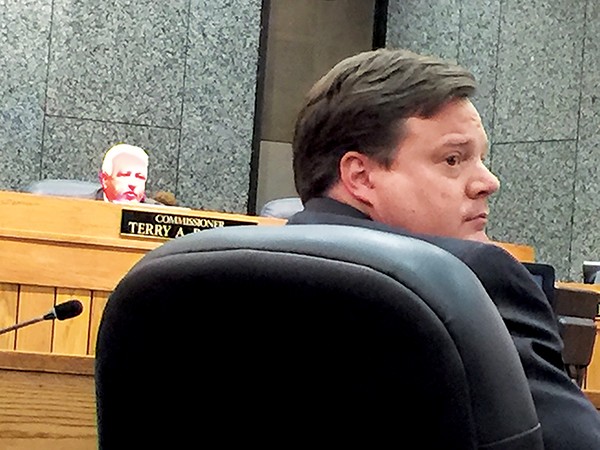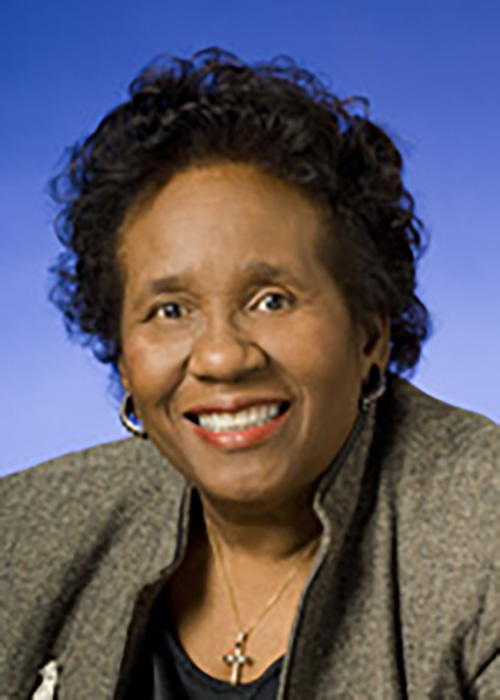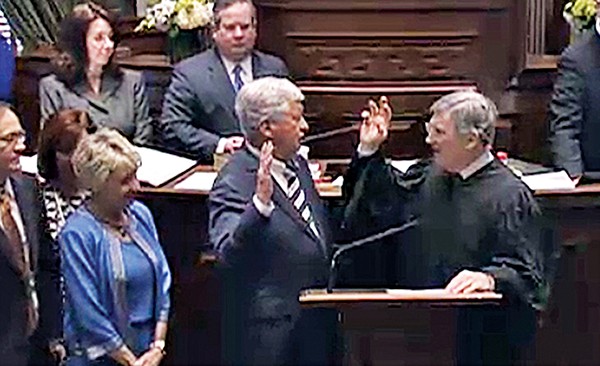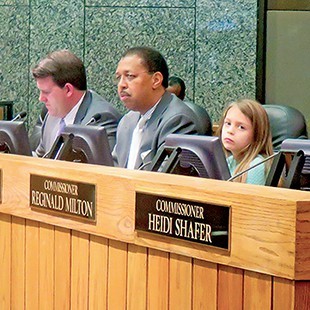Julian Bolton, the former Shelby County commissioner who was appointed two weeks ago by commission chairman Terry Roland as a “special purposes” lawyer to look into the legality of his (Bolton’s) being hired by the commission as its permanent independent counsel, responded to Roland on Monday with a lengthy series of citations from the County Charter. All seemingly attested that he could indeed be hired, a prior finding by County Attorney Ross Dyer to the contrary notwithstanding.
The commission promptly voted 8-5 on Monday in favor of a resolution from chairman Roland to carry out the hiring.
 Jackson Baker
Jackson Baker
Chairman Roland and County Attorney Ross Dyer seemed focused on another matter here, but they were much on each other’s mind on Monday.
Dyer chose not to comment on the new development, other than to reaffirm his contention of two weeks ago that any permanent attorney hired by the commission would have to be a member of his (Dyer’s) staff, paid by him, and managed by him. And, since Dyer determined that he and the commission chair would have to agree on a candidate, the county attorney in effect had claimed veto power over any such appointment.
All that had seemingly scotched a resolution offered at the time by Roland to hire Bolton — as a decisive first move in a commission effort to assert its authority at the expense of County Mayor Mark Luttrell, who, a clear majority of commissioners believed, had over the months been ritually usurping prerogatives that either did not exist or that were more properly those of the commission to administer — both in determining policy generally and in fiscal administration, specifically.
Back in the 1990s, the Memphis City Council had engaged Allan Wade as its own independent attorney to sift evidence, make arguments, and determine policy in contradistinction to the city attorney and the office of the mayor. Wade was the model for the position the commission intended to create.
For weeks the commission had been battling Luttrell, and Dyer, both of whom had maintained the County Charter permitted only one county legal office under the direct administration of the mayor serving as legal advisor to all aspects of county government, including the affairs of the commission itself.
Two weeks ago, at the time of the first abortive resolution to hire Bolton as an independent lawyer, Dyer had, as indicated above, rejected that idea, but to mollify Roland et al., had suggested that, for specific, limited purposes, the commission could, as it had during moments of the city school-merger controversy of 2010-13, and, as it had during wrangling at Chancery Court over the various ways of reapportioning itself, hire an attorney for special, limited, non-recurring purposes.
“Fine,” announced Roland, who withdrew his original resolution and hired Bolton on the spot for the “single purpose” of countering Dyer’s case against the county commission’s hiring Bolton as a permanent and full-time independent counsel.
From that point, the Luttrell administration and the commission went on to hold what had been a preordained “budget summit” last Friday at St. Columbia Episcopal Conference & Retreat Center in Bartlett. The purpose was to reach a meeting of the minds on some of the issues dividing administration from commission and, if possible, to get on the same page regarding matters at large.
With Luttrell and Roland sitting side by side as co-chairs for the event, with principals from throughout county government sharing breakfast and lunch at the casual affair, and with a polite discussion of subjects ranging from revenue sources to the respective roles of the commission and the mayor in the budget process to the problem of OPEBs [Other Postemployment Benefits] to educational spending to recondite aspects of the county wheel tax and county infrastructure, all gathered did seem to achieve some sense of accord.
Interestingly, one idea that became something of a hit at the conference apparently derived from research by Bolton, who determined that in virtually every corner of Shelby County there were unused county-owned enclaves that could serve as office space for the county commissioner whose district happened to coincide with the available space.
One commissioner, Mark Billingsley, who represents Germantown, professed himself happy with the prospect.
So lingering was the mood of concord and free sharing of information on Friday, so warm and comfortable the sense of common purpose, that developments on the following Monday came as the proverbial cold shower.
By Monday morning, ad hoc attorney Bolton had made his report to chairman Roland, who distributed copies to the full commission.
Bolton’s report, based on his reading of the County Charter, said, in great and specific legal detail, that “the legislative power of the county is vested in the Board of County Commissioners of Shelby County [and] includes all lawful authority to adopt ordinances and resolutions governing the operation of government or regulating the conduct and affairs of the residents of Shelby County.”
From that broad first declaration, Bolton, citing codes and sections from the charter, went on to state that “the charter clearly subordinates the position of the chief executive officer, i.e., county mayor,” whose role is “to see that all resolutions and ordinances of the board of county commissioners and all laws of the state subject to enforcement by them or by the officers who are subject under this charter, to their direction and supervision are faithfully executed.”
Bolton’s memo went on and on in this vein, but its bottom line contention is that the commission, not the mayor, is the county’s chief governing authority. On the matter of the county attorney’s authority claimed by Dyer, Bolton writes, “The rules of statutory construction do not allow the subordinate office of the County Attorney, although chief counsel for the commission, to impair, frustrate, nor defeat the object of a statute, ordinance, or resolution by interpreting that ‘chief counsel’ means ‘sole counsel,’ absent specific statutory, or charter authority.”
All of this readily convinced Roland to add the new appointment resolution making Bolton a de facto independent attorney for the county commission. The actual vote on his resolution Monday was 8-4, in favor, with Democrat Van Turner demurring and four Republican commissioners — David Reaves, Billingsley, Steve Basar, and George Chism voting no.
Various reasons were adduced for the lack of solidarity with the commission — the fact that Dyer had reportedly interrupted their attempted executive session on the matter Monday morning, declaring it illegal, or allegations that interested Republicans from outside the commission had intervened with individual commissioners against the appointment of a Democrat, Bolton, as the commission’s attorney, rather than a Republican.
The 8-5 vote, underwritten by all Democrats save for Turner and by Republicans Roland and Heidi Shafer (whose argument for enhanced commission authority is this week’s Viewpoint, p. 15), holds for a document that contains a space for Mayor Luttrell to sign.
The county charter would allow the resolution of Bolton’s appointment to become official without the mayor’s signature or, should Luttrell choose to veto it, by a simple majority override on the part of the commission.
The remaining obstacle to the installation of Bolton as an independent attorney representing the county commission is contained in one of the resolution’s enabling clauses: “Be it further resolved that the Shelby County Attorney is directed to prepare a contract under the supervision of the chairman, or his designee, for execution by the parties in accordance with Section 3.03 (A) (D) of the Shelby County Charter.”
County Attorney Dyer has made it clear to his confidants that he has no intention of preparing such a contract, technically forestalling the effect of the document and likely throwing the whole matter into the jurisdiction of Chancery Court for final judgment.

 Jackson Baker
Jackson Baker  Jackson Baker
Jackson Baker 
 JB
JB  JB
JB  Jackson Baker
Jackson Baker 
 Jackson Baker
Jackson Baker